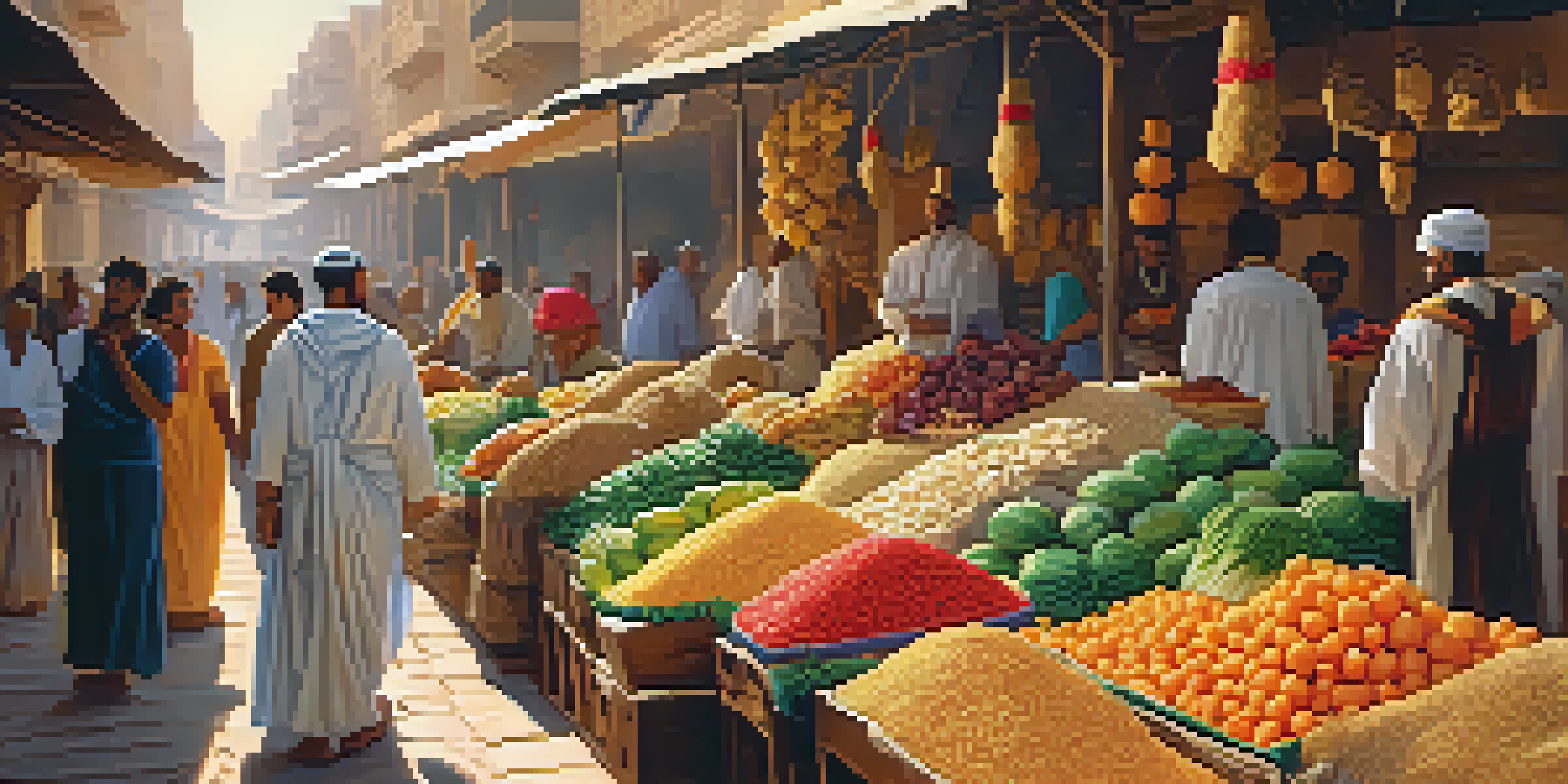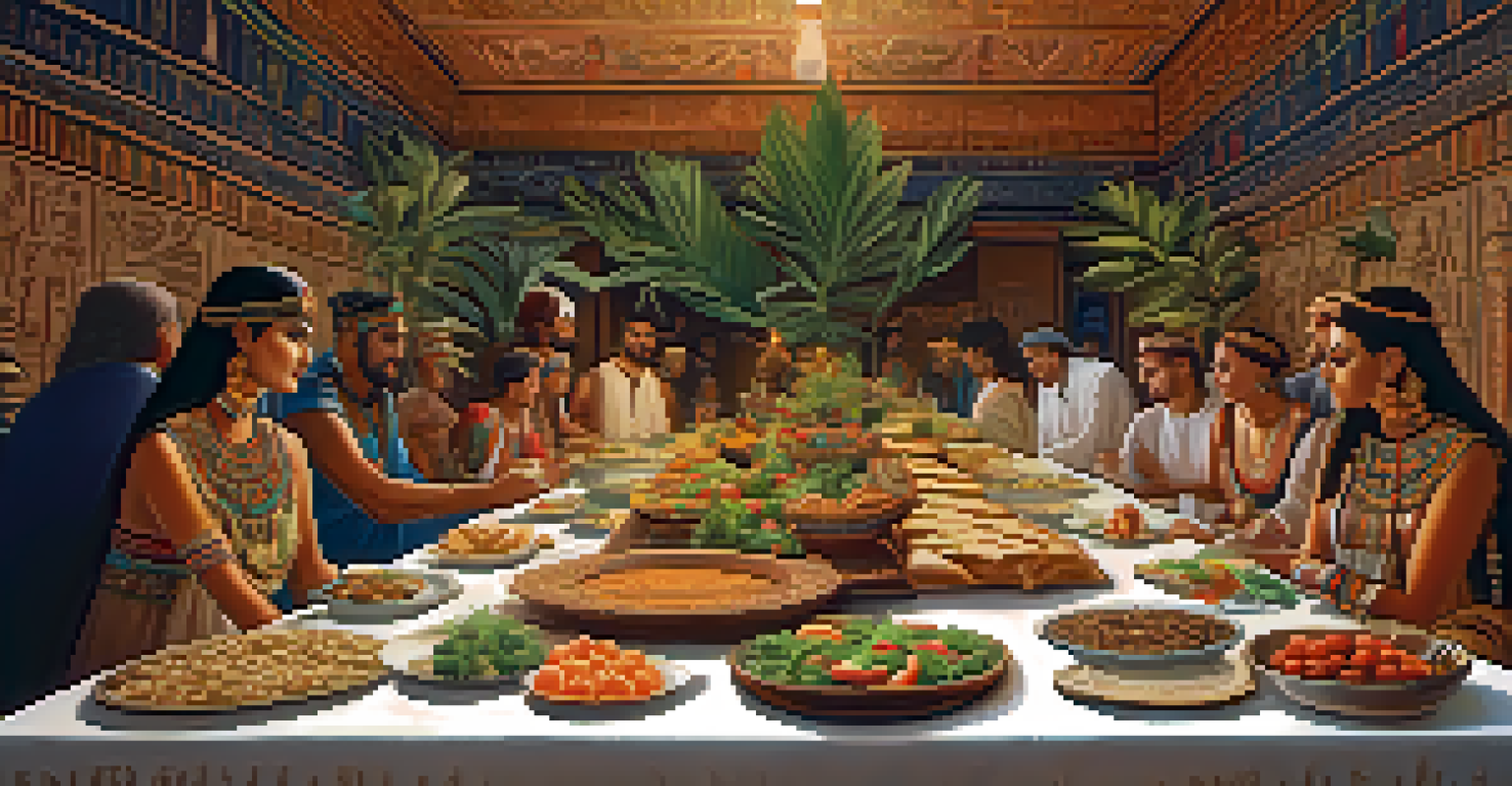Veganism in Ancient Egypt: Food Choices and Beliefs

The Roots of Veganism in Ancient Egyptian Culture
Veganism, as we understand it today, wasn't labeled in ancient Egypt, but its principles were evident in their dietary choices. Many ancient Egyptians embraced a plant-based diet, influenced by religious beliefs and agricultural practices. The fertile Nile Valley provided a bounty of grains, fruits, and vegetables, forming the backbone of their sustenance.
Let food be thy medicine and medicine be thy food.
Moreover, the ancient Egyptians revered certain animals and plants, often associating them with gods and fertility. This reverence led to a dietary preference that favored plant-based foods over animal products, especially among the priestly class. For them, abstaining from meat was a way to honor their deities and maintain spiritual purity.
Funerary practices also reflected this connection to veganism. Offerings of bread, beer, fruits, and vegetables were common, symbolizing nourishment in the afterlife. Thus, even in death, the commitment to a plant-based diet was a testament to their beliefs.
Staples of the Ancient Egyptian Diet
Grains were a cornerstone of the ancient Egyptian diet, with barley and emmer wheat being particularly significant. Bread made from these grains was a staple food, often consumed daily and even used as currency in trade. This reliance on grains not only provided sustenance but also formed a key part of their rituals and celebrations.

Fruits and vegetables also held prominence in their diet. Common produce included lentils, chickpeas, onions, garlic, and various fruits like dates and figs. These foods were not just nutritious but were also celebrated for their flavors and health benefits, reflecting the Egyptians' deep connection to their land.
Plant-Based Diet in Ancient Egypt
Ancient Egyptians embraced a plant-based diet influenced by their agricultural practices and religious beliefs.
Additionally, the ancient Egyptians practiced food preservation methods. Drying, salting, and fermenting allowed them to store surplus produce for leaner times. This resourcefulness ensured that plant-based foods remained a significant part of their diet throughout the year.
Religious Beliefs Influencing Food Choices
Religion played a crucial role in shaping the dietary habits of ancient Egyptians. Many gods and goddesses were linked to agricultural fertility, which made the consumption of plant-based foods an act of reverence. The annual flooding of the Nile was seen as a divine blessing, ensuring abundant harvests and reinforcing their connection to the earth.
The food you eat can either be the safest and most powerful form of medicine or the slowest form of poison.
Certain animals were deemed sacred, such as cows and cats, leading to a cultural aversion to consuming their meat. Instead, plant-based foods became the primary source of sustenance, as they honored the animals that were believed to embody divine qualities. This belief system intertwined food choices with spirituality, resulting in a unique dietary landscape.
Festivals and rituals often featured plant-based offerings, further solidifying the connection between food and faith. These practices emphasized gratitude toward the gods for their blessings, showcasing how deeply ingrained veganism was in ancient Egyptian culture.
The Role of Agriculture in Veganism
Agriculture was the backbone of ancient Egyptian society, directly influencing their dietary choices. The Nile's predictable flooding patterns allowed for the cultivation of a diverse range of crops. This agricultural abundance not only ensured food security but also promoted a diet rich in plant-based options.
Farmers grew various crops, including grains, legumes, and vegetables, which were essential for daily sustenance. This reliance on agriculture made it possible for a largely plant-based diet to flourish. The connection between farming and dietary habits was evident in the Egyptians' respect for the land, which they viewed as a giver of life.
Culinary Traditions and Feasting
The culinary practices of ancient Egypt highlighted a variety of plant-based dishes that were central to their communal feasting and rituals.
Moreover, the agricultural calendar dictated the rhythm of life in ancient Egypt. Festivals celebrating planting and harvest times often featured plant-based foods and rituals, reinforcing the importance of veganism within their culture. This cycle of planting, harvesting, and feasting created a sustainable lifestyle centered around plant-based nourishment.
Culinary Practices and Plant-Based Dishes
The culinary practices of ancient Egypt highlighted their affinity for plant-based dishes. Meals commonly included a variety of bread, porridge, and stews made from lentils and vegetables. These dishes were often seasoned with herbs and spices, showcasing the Egyptians' appreciation for flavor and nutrition.
Cooking methods varied, with baking, boiling, and roasting being prevalent. The use of clay ovens allowed for the preparation of various bread types, while stews were commonly cooked in pots over an open flame. This versatility in cooking techniques made it possible to create diverse and satisfying plant-based meals.
Feasting was an integral part of ancient Egyptian culture, with elaborate banquets showcasing their culinary skills. Plant-based dishes were often at the forefront, served alongside bread and wine. These gatherings not only celebrated food but also fostered community and connection, reinforcing the social fabric of ancient Egyptian society.
Comparative Analysis with Other Ancient Cultures
When examining ancient diets, comparing veganism in Egypt with other cultures is enlightening. For instance, ancient India also had a strong vegetarian tradition influenced by spiritual beliefs. Similarly, both cultures placed great importance on the interconnectedness of life and the ethical implications of food choices.
In contrast, ancient Greece and Rome had a more meat-centric diet, with animals often featured in their feasts. However, they did appreciate vegetables and grains, indicating a blend of dietary preferences. This highlights how geography, environment, and belief systems can shape food choices in diverse ways.
Legacy of Veganism Today
The principles of ancient Egyptian veganism continue to inspire modern plant-based diets, emphasizing sustainability and respect for nature.
Such comparisons reveal that while veganism was prevalent in ancient Egypt due to specific cultural and religious influences, other civilizations often embraced a more varied diet. Understanding these differences enriches our appreciation for the complexities of ancient dietary practices.
Legacy of Veganism in Ancient Egypt Today
The legacy of veganism in ancient Egypt continues to resonate in modern times. Today, many people are drawn to plant-based diets, inspired by health, environmental, and ethical considerations. The ancient Egyptians' practices provide valuable insights into the benefits of embracing a plant-based lifestyle.
Moreover, archaeological discoveries have unearthed evidence of the ancient Egyptian diet, sparking interest in their food choices. Contemporary food enthusiasts and historians often explore these ancient recipes, seeking to connect with the past through culinary experiences. This revival reflects a broader trend toward sustainable eating.

Ultimately, the principles that guided ancient Egyptian food choices—respect for nature, health, and spirituality—remain relevant today. By looking back at their practices, we can draw inspiration for creating a more sustainable and conscious approach to our diets.